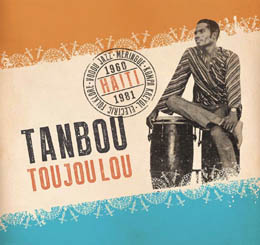|
Tanbou Toujou Lou - Haiti 1960- 1981
|
|
Tanbou Toujou Lou:
While this, the first compilation from Ostinato (not to be confused with the house/techno label of the same name), can be seen as a companion piece to the Strut label's 2014-released Haiti Direct, curator Vik Sohonie, the man behind Ostinato, has cast a slightly more focused net. He's also managed to include the travelogue of his visits to one of NYC's Haitian neighborhoods, Crown Heights, and Haiti itself, both places he scoured for vinyl, into fantastically descriptive and enlightening booklet notes. Those stories, plus a brief history of Haitian music's development in the 20th century, as well as interviews with band members, record label owners and engineers, go quite far indeed in giving as good a compact understanding of how this little sliver of a nation, despite US occupation, gun-barrel leadership by one despot after another, endemic poverty, and the corruption that comes as a result of all of these items and more, managed to have such a vibrant scene over the 20 year period chronicled here.
Sohonie explains that radio, which continues to exert a massive social force, had a lot to do with a development of any sort of modern Haitian music. Soul and jazz from the US, rancheros from Mexico, and more importantly still, sons from Cuba, all influenced, but ultimately gave way to Haitian sounds, themselves connected as much to their northern neighbors as they were to a variety of rhythms that had existed intact in Haiti for centuries. Yet, something like “Erzulie Oh!” by Super Jazz de Jeunes is almost reekingly Latin; Nemours Jean Baptiste's “Haiti Cumbia,” is exactly what its title claims, showing that sounds from coastal Colombia pervaded Haiti's radio stations as well. Yet, underpinning so much of this music are Haitian rhythms such as Petwo and Djo, which mutated slightly over time and punctuated Haitian music in one way or another. And it's these type of rhythmic subtleties that allows the music here to stand on its own.
Haiti may have never had the resources to compete with its neighbors such as Jamaica, Cuba, or the Dominican Republic in terms of vinyl production or record sales, but thanks to a huge Haitian diaspora- brought about at least in large part by the tyrannical reign of both “Papa Doc” and “Baby Doc” Duvalier between 1963 and 1986, records were produced to sell to Haitians elsewhere in the French Caribbean and the US, hence the massive amounts of Haitian vinyl that continues to turn up in NYC. It's those records that have allowed for this compilation to happen, and from absurdly hot tracks such Les Pachas du Canape Vert's “Samba Pachas No. 2,” Trio Select's “La Vie Vieux Negre,” and Les Loups Noirs “Pele Rien,” it never lets up. - Bruce Miller
© 2016 RootsWorld. No reproduction of any part of this page or its associated files is permitted without express written permission.
|

|
|
|